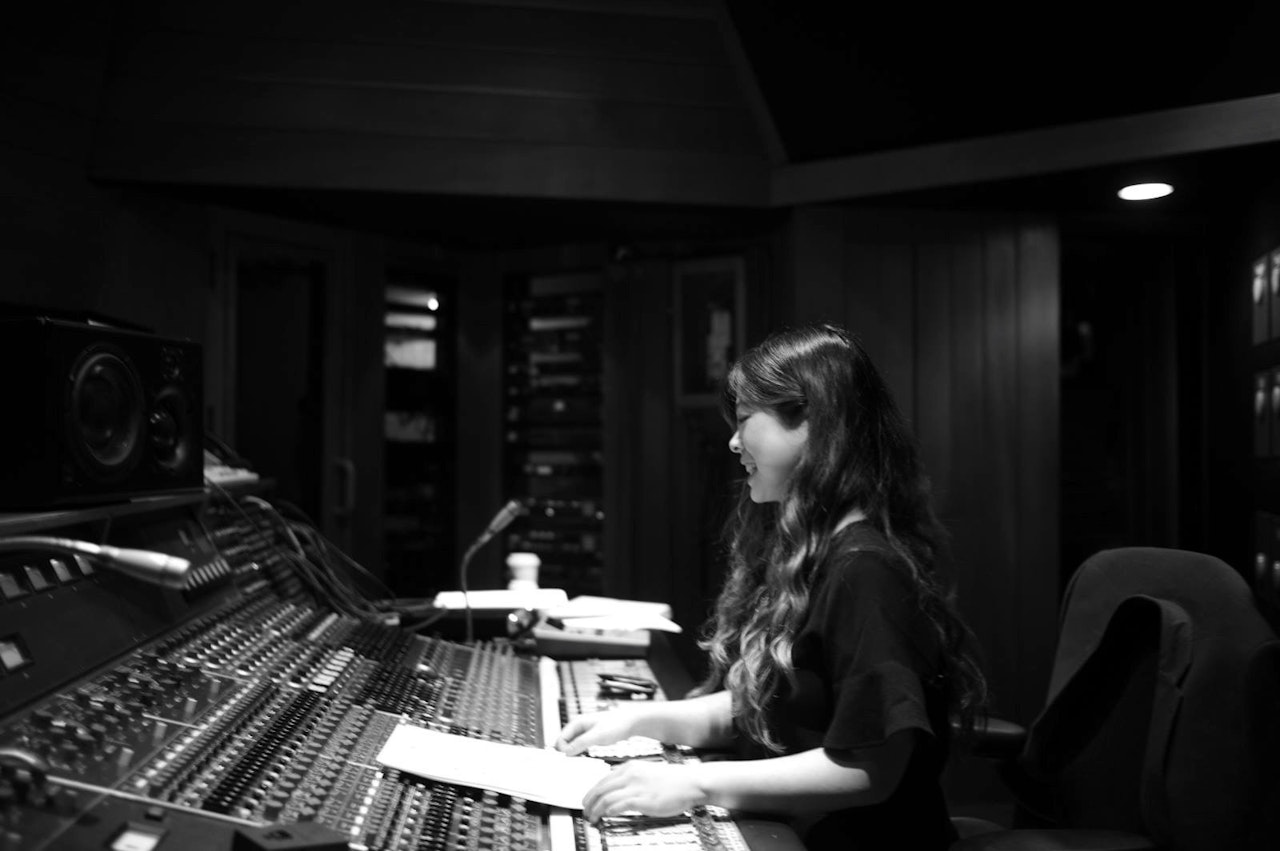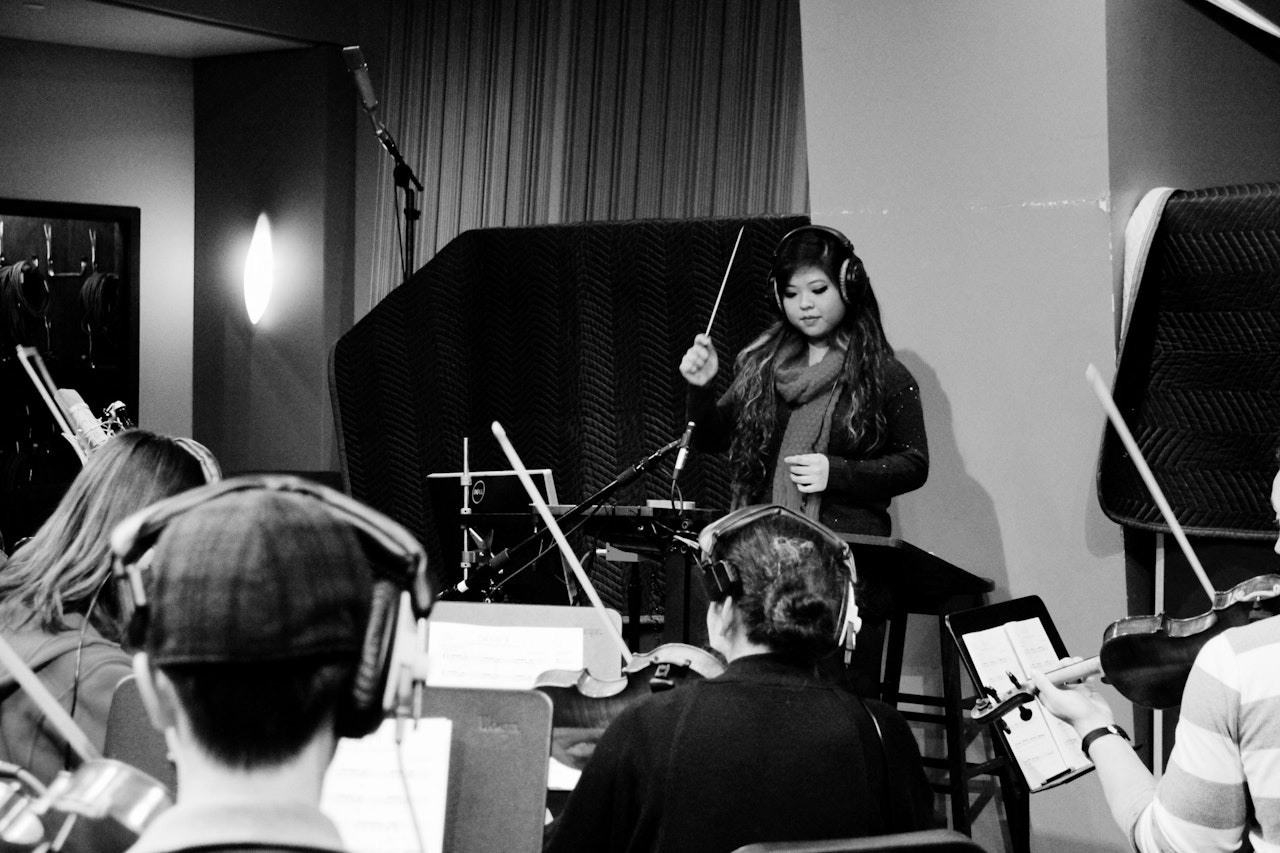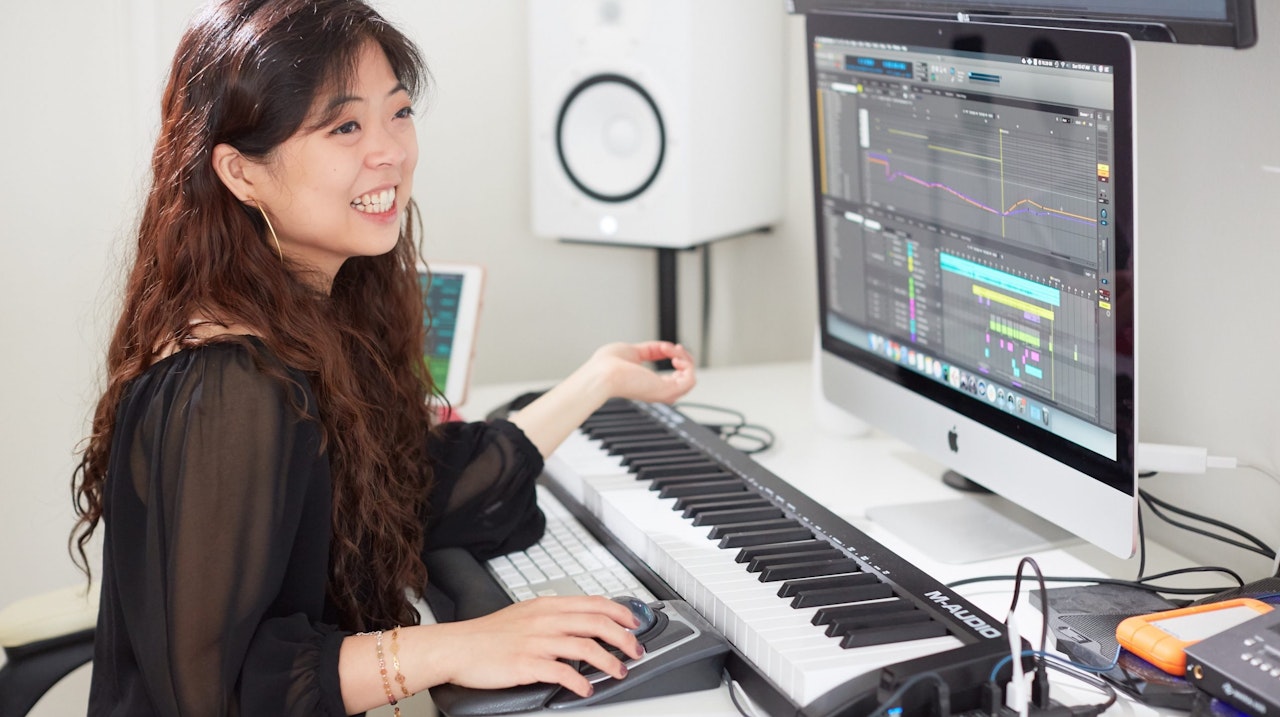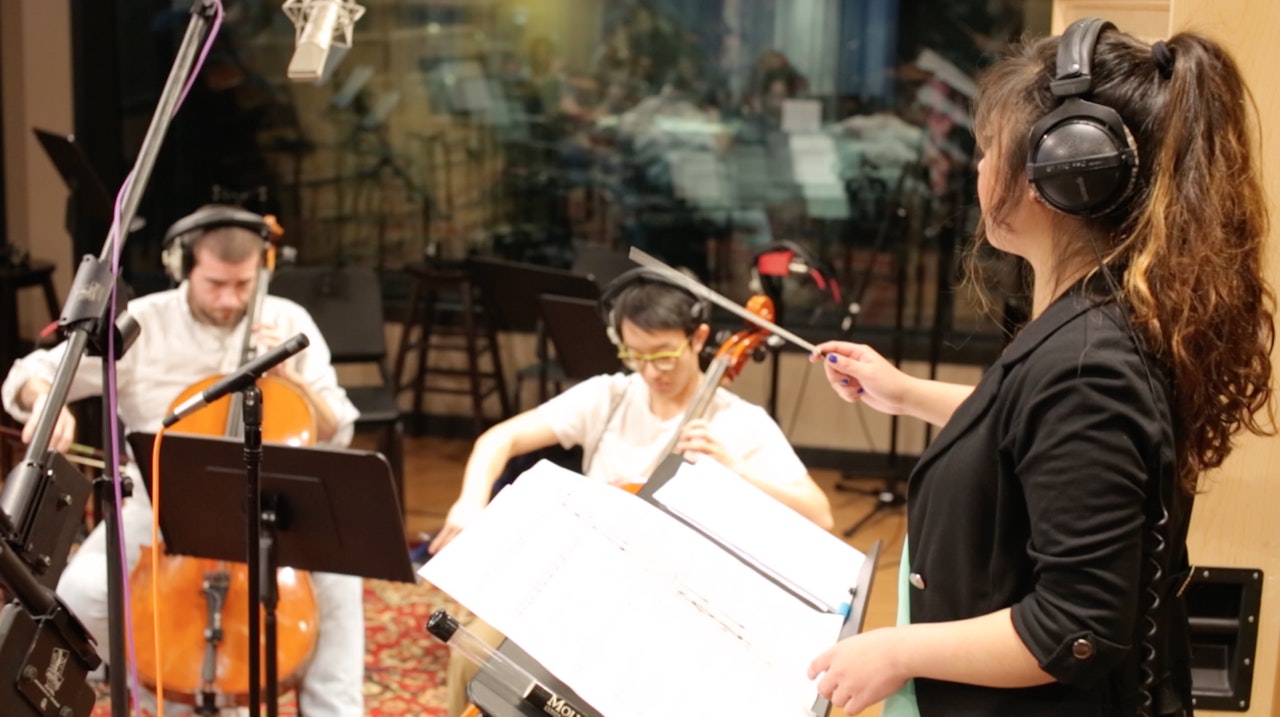Words by Sean Wilson
Composer Joy Ngiaw is a rising star in the world of film music. Having graduated summa cum laude from the esteemed Berklee College of Music, Joy now finds herself in high demand across several high-profile streaming services, including Netflix and Apple TV+.
“I grew up playing classical piano from the age of six,” she explains, “but I found that I enjoyed improvising more than practising! At school during lunch breaks, I would go to the auditorium and would play anything on the piano. Whatever accompanied my emotions. A teacher came, noted that I was composing and said I should look into it.
“I then started paying attention to film and TV, the music especially. In children's films, the music gives you such a nostalgic feeling. That inspired me to pursue film scoring. I realised there was a path there and I went for it."
Joy’s acclaimed score for the 2021 short animation Blush, composed for Apple TV+ and production company Skydance, won her acclaim and a nomination for an Annie Award. She says that there is a particular thrill scoring for animation.
“The beauty of music for animation is that it transcends all ages and ethnicities,” Joy explains. “You don’t even need to speak the same language. Music in this area is so multifaceted and can showcase a wide range of human emotions. As kids, we maybe can’t put it into words but I’m sure we can feel it. When Mufasa dies in The Lion King, you feel the grief. It’s not something you can put into words.”
The beauty of music for animation is that it transcends all ages and ethnicities.
Joy was tasked with stitching together the musical world of Blush, which shows us what happens when an astronaut/horticulturist makes an astonishing discovery after crash-landing on a distant planet. As with so many animated films, there’s a great deal more going on beneath the surface.
“The storyboards were already so impactful,” she recalls. “But then the director Joe Mateo explained that it was based on his own story. His late wife had died of breast cancer. The message that he wanted to convey is that grief is such a universal language. But we can move on and bring healing, love and hope.


“My favourite part of any collaboration is figuring out the why. Why does the filmmaker want to do it? Understanding them can really help in the composition. It acts as the backbone of every decision that I make, whether it’s building the sound palette or instrumentation.
“I’m trying to think of the story and I’m allowing the music to go along with it. Film scoring is trying to convey the director’s message. Given that family was the oxygen of the story, I decided to play with the idea of air. I incorporated breath elements into the score.”
Understanding the filmmaker can really help in the composition. It acts as the backbone of every decision that I make.
Regarding instrumentation in Blush, Joy says she focused “a lot of wind instruments to give it that airy quality.” She adds that the use of wind chimes “gave the feeling of memory.” Elaborating further, she says: “Spotting was very intentional – when the music comes in and when the music goes out. Likewise with the breaths.”
Joy proudly hails from a Chinese-Malaysian background, something she has channelled into her captivating score for an episode of the Walt Disney Animation Studios show Short Circuit: Jing Hua. She says it was “an honour” to create the score for a “fantastic programme”, crediting it as a pivotal stepping stone into writing music for animation. According to Joy, it allowed her to channel her Chinese heritage including “watercolour, calligraphy, kung-fu and martial arts… The music was Chinese-driven, and I was glad to be involved.”
The musical idioms of the Far East have often been filtered through Westernised, Hollywood film scoring, with high points including Jerry Goldsmith’s majestic, Oscar-nominated Mulan. Joy says it’s always fascinating to hear her culture refracted in such a manner and she praises the diverse array of voices currently at work in the film music industry, from the Central American influence of Encanto (scored by Germaine Franco and Lin-Manuel Miranda) to Raya and the Last Dragon (scored by James Newton Howard).
Watercolour, calligraphy, kung-fu and martial arts… The music was Chinese-driven, and I was glad to be involved.
“It showcases more diverse stories,” she says. “I’m very lucky to be part of this momentum which encourages people to listen to new ideas and perspectives, and to learn about different cultures. So many great industry figures helped pave the way and now the new generation gets to take advantage of this momentum. I think the industry wants to hear new stuff right now.”
In addition to her work for animation, Joy has amassed an enviable number of credits as an assistant composer on acclaimed TV shows including The Night Of, Legion and Cobra Kai. She describes the shows as “her first opportunities in the industry”.
“I was on the music team of those shows and it was amazing to learn from these composers,” she says. “As a result of that, I now have the privilege of scoring my own TV shows coming out soon: one animated, and the other live action. For the animated TV shows, because music is so important in setting the tone, they brought me on early so we could all work together with the animators. For the live-action show, I’m coming on later in the process and I’m submitting temp music that I already have. It’s really fun being dynamic while switching between two different teams.”

Joy is also at the vanguard of women composers making greater in-roads into film scoring. In fact, she landed the Short Circuit gig after discovering a Facebook group dedicated to women film composers.
“I was on this ‘women in music’ page,” she explains, “and it didn’t even mention it was for a Disney project. They were just asking for people to submit a reel and I already had some music written. I then found out it was Disney, and they were experimenting with different voices. There’s a demand now to hear new voices.”
The industry is notoriously disproportionate in terms of how it’s geared towards men, but Joy is hopeful that positive change is starting to take place.
“When I was part of the Blush scoring meetings at Skydance, I felt that I was being treated as the composer, and not specifically as a female composer or a female Asian composer,” she recalls. “It was a question of asking, well, what do I think as the composer? What are my ideas? That gives me more courage. I got hired for my perspective.
More and more studios are becoming open to trying out new voices. It’s a great time to be in this industry... there’s more openness.
“More and more studios are becoming open to trying out new voices. I see so many films now where I’m unfamiliar with the composer and it compels me to go check out their music. It’s a great time to be in this industry. There’s more openness. I think the big studios are listening and are open to change. There’s still progress to be made. There are so many female composers that I admire but I don’t look at them as such. I feel like the industry is constantly evolving.”
Joy is among a raft of rising composers who are poised to capitalise on the upsurge in streaming. Quite apart from her Apple TV+ work, she has also branched out into projects for Netflix (dog movie Rescued by Ruby, starring The Flash’s Grant Gustin), which will surely help in terms of exposure to her music.
She observes that there is “so much more demand for content”, adding: “During the pandemic, animation didn’t stop, so I suppose that’s a little bit of a silver lining to come from the situation.”
Joy says that Rescued by Ruby was scored remotely during the onset of the COVID-19 pandemic and, like many of her peers, it forced her to get creative with mixing technology. She credits one particular bit of software that helped transcend the limitations of not being in the same room as the orchestra players.
We got back in the room with live musicians when we did Blush. It was a beautiful reminder of how important human connection is.
“I have a long-time collaborator, Frank Wolf, who was my score mixer on both Blush and Rescued by Ruby,” Joy explains. “He works from his studio in L.A. and I’m in mine. There is a piece of software called Audiomovers where the audio replicates exactly how it sounds in Frank’s studio, only through my own speakers. It all depends on how the room is, and how the mic is set up. The acoustic part is really interesting, and the engineers are fantastic.


“I can’t believe technology can do this, but it feels like I’m in the studio with him. It feels like we both have control, even though we don’t have to be physically in the same room. It’s so cool we can do that right now. The dream is still to be there in person but given the circumstances, it’s a great workaround. We got back in the room with live musicians when we did Blush. The first time we all met in person was for the scoring session at Fox Studios. It was a beautiful reminder of how important human connection is.”
So, what’s on the horizon? “Right now, I’m working on the two TV shows that I mentioned earlier. The animated show will be on Apple TV and the live-action show will be on Netflix. I’ll be busy with those over the next few months!”
